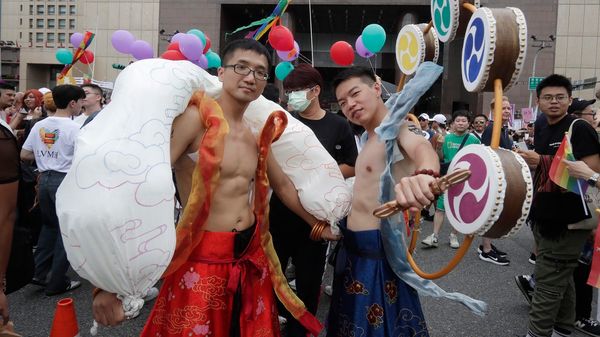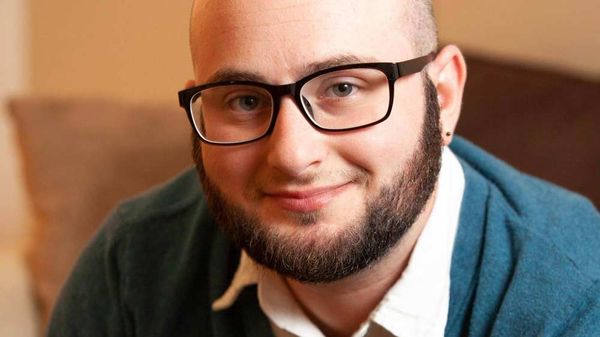July 19, 2007
Popular DJ arrested in P'town
David Foucher READ TIME: 8 MIN.
Barry Scott, a popular radio DJ, is fighting charges of resisting arrest, disorderly conduct and disturbing the peace after being arrested at a Provincetown party on July 14. But Scott and attendees at the private party contend that it was the police who violently overreacted in quashing the festivities, injuring Scott and his partner, Bryan Richardson, in the process.
Acting Provincetown Police Chief Warren Tobias said that based on his reading of the "numerous and detailed" police reports of the incident, "I would have to say that I do not believe the police overreacted." Tobias declined to make the police reports available to Bay Windows, citing the ongoing legal proceedings related to Scott's arrest.
Scott pleaded not guilty to the charges in Orleans District Court on June 16. He is due back in court for a pre-trial conference on Aug. 1. Scott declined to comment on the circumstances of his arrest, citing his ongoing court case.
According to Scott's written account of the events - contained in an email that has circulated among LGBT activists and was obtained by Bay Windows - and interviews with Richardson, Eddie Foley, the guest of honor at whose home the party took place, and John Donovan, one of the party organizers, the trouble began early in the evening at 4 Holway Ave., where about 50 friends and family members gathered in Foley's backyard to celebrate his 40th birthday. Scott, who hosts the weekly radio show The Lost 45s on Oldies 103.3 and is friends with several of the attendees, was deejaying at the event.
Between 6:30 and 7:30 p.m., according to witnesses, two police officers showed up at the party and informed Donovan that there had been a complaint about the music and that the volume needed to be reduced in accordance with a local noise by-law stipulating that music may not be audible at a distance of 50 feet or more from its point of origin. Donovan said he questioned officers about the complaint and who made it, to which one of the officers responded with a "nasty surly attitude and I could not understand why. There was nothing about my tone that would have caused him to be rude." Donovan asked Scott to lower the music. He estimated that Scott reduced the volume to about half of what it had been prior to the officers' visit. Richardson also turned the speakers to face the house so as to minimize the noise, according to Donovan.
The officers returned about an hour later, at which point they issued a $50 citation to Foley for violating the noise by-law. Richardson said he asked an officer's advice in determining what would be a reasonable level at which to play the music. The officer, said Richardson, told him to "walk 50 feet and have somebody stand at the radio until you can't hear it anymore. There's your reasonable level."
At that point Richardson said Scott turned the music "way down," but that guests continued to enjoy themselves. According to attendees who spoke to Bay Windows, the party was a low-key gathering of people who ranged in age from 30-something to mid-50s. Many of them, said Foley and Donovan, do not drink alcohol. They said there were no drugs at the party. "It wasn't a rave," said Foley. "It was just, like, a real sedate party."
At approximately 10:30 p.m. the police - this time two cruisers and four officers - again returned to the party in response to a complaint about loud music, at which time Scott conferred with them. In his email describing the events, Scott said he told the officers he would stop the music immediately. He then announced over the microphone that the police wanted the party to end. According to witnesses, in his announcement, Scott, who owns a home in the town, politely complained that taxpaying town residents could not enjoy a birthday party in their own homes. But before Scott could finish his statement, according to Scott and other witnesses, the officers accused him of inciting a riot and rushed to arrest him. "The whole party was standing there shocked," said Foley.
Richardson said he heard an officer tell Scott not to resist, to which Scott, who stands approximately 5'4" and weighs about 135 pounds, loudly responded several times "I am not resisting."
"They did not care," Scott wrote in his email. "I was smashed into the wall of the house head first and [a nearby] propane tank ... Blood was coming from the top of my nose where there was a large laceration and blood gushing from inside my nose as well." Scott also alleged that an officer kicked him in the leg with such force as to knock off his sneaker, at which point the officer stepped on Scott's bare toes.
As they watched the scene unfold, stunned guests shouted about police brutality. "They just really roughed him up for no reason whatsoever," said Foley.
Said Donovan, "It was like a scene out of a bad movie."
Tobias, who stressed that he could not discuss the arrest in detail as it is still an open legal matter, said he believes the officers acted appropriately. He pointed out that there were "numerous complaints about the party from residents of the neighborhood."
He also stated that police "responded in a tempered manner" by using gradual sanctions against the party hosts during their first two visits to address the complaints. Tobias notes that officers handled similar noise complaints about a party earlier in the summer "in the exact same manner. We have not done anything to change or alter our response." Tobias expressed his belief that Scott's actions when police arrived for the third time "escalated the situation," which resulted in his being arrested.
Scott was handcuffed and taken to the police station in a cruiser. Though he was not placed under arrest, Richardson was also cuffed and taken away. According to his account of the events, when Richardson asked the police why they were arresting Scott, officers accused him of also attempting to incite guests on the microphone, which Richardson denied. He said officers then told him he was being taken into protective custody for being drunk and disorderly. Richardson said he had just one drink that night and was not intoxicated. Tobias said he could not disclose why Richardson was taken into custody, again citing the open court case.
Richardson said he suffers from chronic back problems for which he was treated at a hospital about a week prior to the party and although he informed the officers of his condition as they handcuffed him, he was thrown up against the side of a police cruiser before being taken away. At the police station, he was placed alone in a cell, where he lay on the floor, unable to get up on his own because of his back injury. Richardson said officers repeatedly ignored his pleas for help getting up so he could use the bathroom, causing him to wet his pants.
Scott suffered a large cut on his nose and wrote that he has a welt on his leg where the officer kicked him.
Richardson, who works as a personal chef, said he sought medical treatment at Mass. General on July 15 and was told that his back has been re-injured. He said he is currently unable to work.
Tobias said he was unaware that Richardson had been injured in the incident. He did not respond to a follow-up request from Bay Windows to address Richardson's complaint about officers ignoring his pleas for help to use the bathroom.
Party attendees who spoke with Bay Windows seemed at a loss to explain why the officers responded in what they perceived to be an overly aggressive manner. Richardson suggested that it was due to the inexperience of what he called "rental" police officers - those who are hired just for the summer tourist season and aren't trained as well as year-round members of the force.
"They don't understand what's considered a problem," Richardson asserts. "To me 30 people that are sitting in a backyard listening to "Dancing Queen" is not the type of crowd that I'm going to consider that's going to give me a problem. ... I don't think they have the proper training."
Tobias conceded that the seasonal police officers "do not have the same level of training as the full time officers." But he also said that summer officers are required to attend the Massachusetts Criminal Justice Training Council's Reserve/Intermittent Police Academy, which affords them "approximately half the amount of training of the full time academy." Summer officers also go through a weeklong orientation run by the Provincetown Police Department, which includes presentations by local organizations aimed at educating officers on the culture of the town. "I really don't see that as part of any issue - their level of training," said Tobias. Two of the officers involved in the arrest were full-time Provincetown officers; the other two were seasonal officers.
Donovan has sent a letter of complaint to Tobias, Town Manager Sharon Lynn and the Board of Selectman demanding an investigation into the conduct of the officers who responded to the noise complaints. Donovan said he believes they wrongfully acted out of anger toward Scott because of the comments he made about the police ending the party. "It is a free country and we're allowed to say whatever we want to say," said Donovan. "What he said was polite, it wasn't rude, there was no profanity. It was just a polite signoff message."
Scott's attorney, Christopher Snow, observed that Scott's announcement "incited not the crowd, but the police." Said the Provincetown attorney, "It was simply a serious, serious error in judgment, in our perspective, on behalf of one or more police officers."
Neither Scott, in his email, nor any of the witnesses interviewed for this story raised anti-gay bias as a possible motivator in the incident. Asked whether it was a possibility, Donovan, for instance, conceded that just because the officers work in Provincetown "doesn't mean that they're completely prejudice free." But he also stated, "I don't know. I honestly don't know."
However, the charge of anti-gay bias on the part of the officers has been floated in blog postings on KnowThyNeighbor.org (though Tom Lang, who maintains the blog, took the post down the day after it was posted), BlueMassGroup and DemocraticUnderground.com. Tobias was aware of such postings and strongly objected to the characterization of Provincetown police officers as gay bashers. "It's a shame that they're doing that," said Tobias. "Because I can tell you that this is not a gay issue. It is a quality of life issue in the neighborhood about noise.
"The men and women of this police department are among the most highly trained in sensitivity issues" ranging from sexual orientation to race, religion and gender, Tobias continued. "Our officers are among the most highly trained and I know that my officers would not allow any of those issues to interfere in their judgment. And I would take issue with anybody who would say differently."
A July 15 press release from the Gay and Lesbian Anti-Violence Project announcing that the organization had formed a legal defense fund for Scott, notes: "Given the disproportionate police response, we immediately suspect that homophobia may have played a role in the way Scott was treated."
Don Gorton, chair of the Anti-Violence Project, sent a letter July 17 to Tobias and Provincetown Town Manager Sharon Lynn requesting a formal investigation into the "use of force" against Scott during his arrest.
The letter also requests that the investigation look into "whether the police conduct in question should be classified as a hate crime for purposes of the Hate Crime Reporting Act of 1990." In his letter, Gorton notes that the use of anti-gay slurs are not necessary to indicate anti-gay bias. "Other bias indicators offer ways of identifying motive that assailants might seek to conceal with a sophisticated avoidance of hate language," he writes.
-----
Legal defense fund formed
The Gay and Lesbian Anti-Violence Project has formed a legal defense fund to help Barry Scott pay for his defense of charges of resisting arrest, disorderly conduct and disturbing the peace. The fund can also be used, Anti-Violence Project Chair Don Gorton said in an email, for "affirmative litigation to rectify the apparent civil rights violations" made during Scott's July 14 arrest.
Contributions to the fund, which are tax deductible, can be made to the Gay and Lesbian Anti-Violence Fund with a note that the money should go to Scott's legal defense. They should be mailed to The Gay and Lesbian Anti-Violence Project, 138 Chandler St., #4, Boston, MA 02116.
- Susan Ryan-Vollmar
David Foucher is the CEO of the EDGE Media Network and Pride Labs LLC, is a member of the National Lesbian & Gay Journalist Association, and is accredited with the Online Society of Film Critics. David lives with his daughter in Dedham MA.







